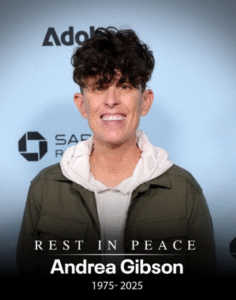Andrea Gibson, a celebrated spoken word poet and LGBTQ+ activist, has died at the age of 49. Known for their powerful and deeply emotional performances, Gibson’s work tackled themes such as gender identity, mental health, love, loss, and social justice. Their death was announced on social media and confirmed by loved ones, who noted that Gibson passed peacefully at home surrounded by family and close friends.
Gibson, who used they/them pronouns, had previously shared with their audience that they had been diagnosed with ovarian cancer in 2021. Throughout their battle with the illness, they remained open about their experience, often using it as a platform to inspire others through vulnerability, resilience, and poetic grace. Even in their final months, Gibson continued to write, speak, and connect with fans through livestreams, poetry readings, and social media.
Born in Calais, Maine, in 1975, Gibson rose to national prominence in the early 2000s after competing in slam poetry competitions. They won the first-ever Woman of the World Poetry Slam in 2008 and went on to become one of the most influential voices in contemporary spoken word. Their performances were marked by intensity, honesty, and lyrical beauty that resonated with audiences from all walks of life.
Over the years, Gibson released several poetry collections and spoken word albums, including Pole Dancing to Gospel Hymns, The Madness Vase, Lord of the Butterflies, and You Better Be Lightning. Each work explored deeply personal and universal experiences, often emphasizing themes of healing, identity, and courage. Their poetry has been praised not just for its artistic merit but also for its capacity to comfort and empower marginalized communities.
In addition to their literary accomplishments, Gibson was an outspoken advocate for LGBTQ+ rights and mental health awareness. They often used their platform to uplift queer and trans voices, and their poetry frequently served as a source of affirmation for those struggling with self-acceptance. Gibson’s work was recognized for helping many young people find language for their identities and experiences when mainstream culture offered little support.
Tributes from fellow poets, fans, and activists flooded social media following the news of their death. Many expressed gratitude for the ways Gibson’s work had transformed their lives and helped them feel seen and understood. Fellow poet and friend Alok Vaid-Menon described Gibson as “a lighthouse for so many queer people navigating storms of shame and isolation.” Others noted that Gibson’s voice would live on through the lives they had touched and the poems that continue to circulate in classrooms, therapy sessions, and coffee shop open mics.
Despite the pain of their illness, Gibson maintained an ethos of joy, love, and wonder. They once wrote, “Don’t ever forget you are a river of light. You were never meant to crawl, darling.” Such lines have become a source of strength and solace to those mourning their passing. Their final posts and poems continued to reflect on mortality, hope, and the sacredness of connection, even in the face of death.
In their last months, Gibson worked on a forthcoming book and shared updates with their community, often reflecting on the gift of being alive. They wrote about saying goodbye not with despair but with reverence. “Death isn’t the opposite of life—it’s a part of it,” they said in a recent livestream. “If we love deeply, we grieve deeply, and that’s a sign of how real our connections have been.”
Andrea Gibson leaves behind a legacy of fearless truth-telling, tender rebellion, and radical compassion. Their poetry will continue to echo in the hearts of those they moved, reminding readers and listeners to live authentically, love fiercely, and speak boldly.


